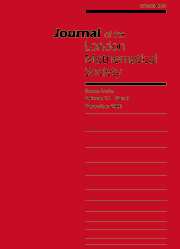Crossref Citations
This article has been cited by the following publications. This list is generated based on data provided by
Crossref.
Eick, Bettina
and
Müller, Jürgen
2006.
On p-groups forming Brauer pairs.
Journal of Algebra,
Vol. 304,
Issue. 1,
p.
286.
NENCIU, ADRIANA
2008.
BRAUER PAIRS OF VZ-GROUPS.
Journal of Algebra and Its Applications,
Vol. 07,
Issue. 05,
p.
663.
Humphries, Stephen P.
and
Johnson, Kenneth W.
2009.
Fusions of Character Tables II:p-Groups.
Communications in Algebra,
Vol. 37,
Issue. 12,
p.
4296.
Lewis, Mark L.
2009.
The vanishing-off subgroup.
Journal of Algebra,
Vol. 321,
Issue. 4,
p.
1313.
Nenciu, Adriana
2009.
Brauer t-tuples.
Journal of Algebra,
Vol. 322,
Issue. 2,
p.
410.
Humphries, Stephen P.
Kerby, Brent L.
and
Johnson, Kenneth W.
2010.
Fusions of character tables III: Fusions of cyclic groups and a generalisation of a condition of Camina.
Israel Journal of Mathematics,
Vol. 178,
Issue. 1,
p.
325.
HUMPHRIES, STEPHEN P.
and
RODE, EMMA L.
2012.
Weak Cayley tables and generalized centralizer rings of finite groups.
Mathematical Proceedings of the Cambridge Philosophical Society,
Vol. 153,
Issue. 2,
p.
281.
Humphries, Stephen P.
and
Nguyen, Long
2015.
Weak Cayley Table Groups II: Alternating Groups and Finite Coxeter Groups.
Communications in Algebra,
Vol. 43,
Issue. 11,
p.
4763.
Humphries, Stephen P.
and
Nguyen, Long
2017.
Weak Cayley table groups III:PSL(2,q).
Communications in Algebra,
Vol. 45,
Issue. 7,
p.
3110.
HUMPHRIES, STEPHEN P.
and
PAULSEN, REBECA A.
2018.
WEAK CAYLEY TABLE GROUPS OF SOME CRYSTALLOGRAPHIC GROUPS.
Glasgow Mathematical Journal,
Vol. 60,
Issue. 3,
p.
635.
Lewis, Mark L.
2018.
Group Theory and Computation.
p.
141.
Bagherian, Javad
2019.
Camina Triples and the Wedge Product of Association Schemes.
Bulletin of the Iranian Mathematical Society,
Vol. 45,
Issue. 5,
p.
1515.
Johnson, Kenneth W.
2019.
Group Matrices, Group Determinants and Representation Theory.
Vol. 2233,
Issue. ,
p.
177.
Johnson, Kenneth W.
2019.
Group Matrices, Group Determinants and Representation Theory.
Vol. 2233,
Issue. ,
p.
1.
Burkett, Shawn T.
and
Lewis, Mark L.
2021.
A Frobenius group analog for Camina triples.
Journal of Algebra,
Vol. 568,
Issue. ,
p.
160.

